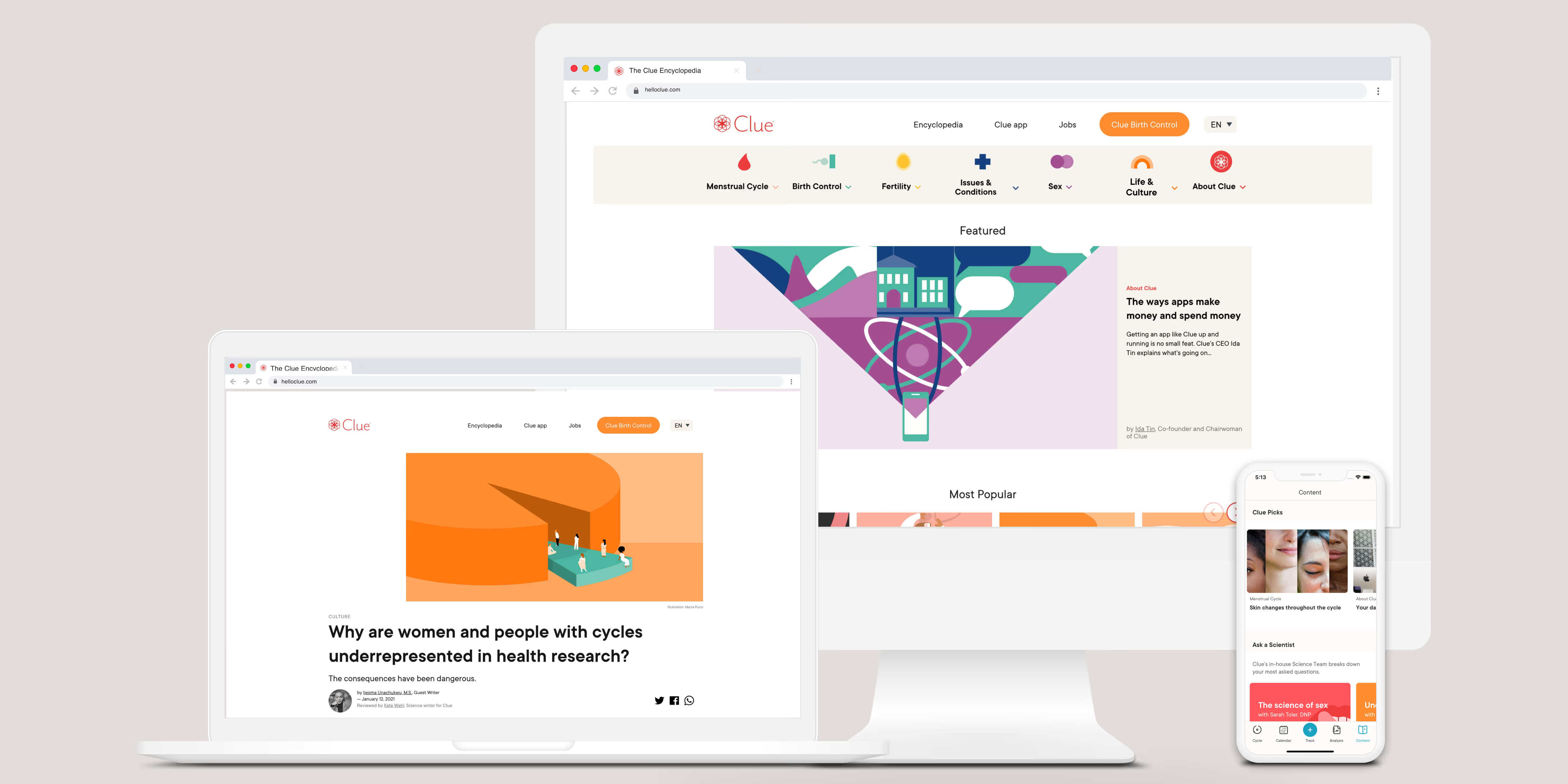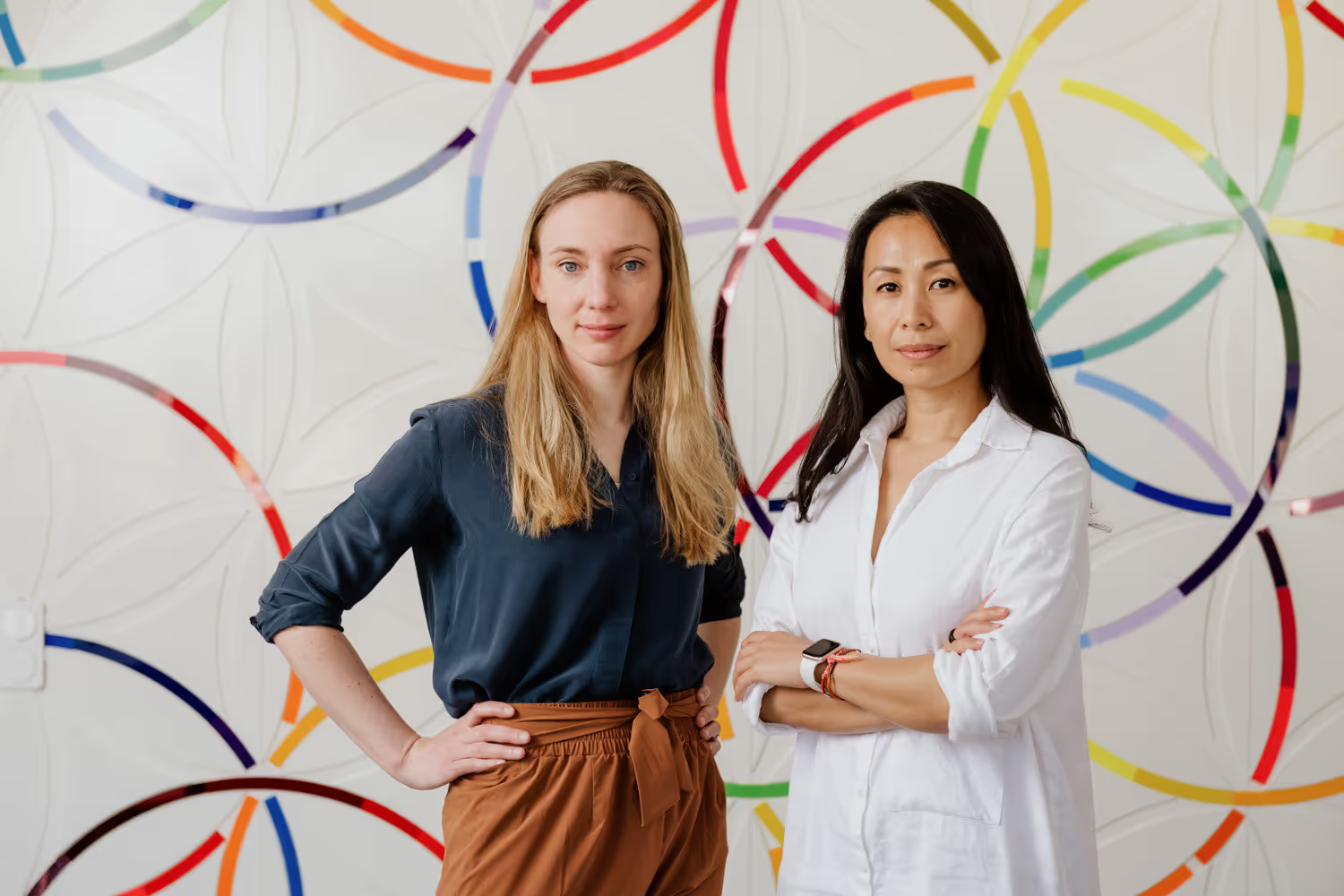Listen now
The concept of co-CEOs is not unheard of, albeit somewhat rare in the startup world. Some notable public tech companies currently boasting a twin-leadership structure include Netflix, Salesforce, and Workday. And this is the structure that Clue – one of the world’s most known FemTech companies – took in 2021 as the company revealed two new CEOs: Audrey Tsang and Carrie Walter.
Finding a mission that resonated
The duo complements each other; with joint values and a shared purpose, and what at times looks like a psychic connection. “We're not wearing the same clothes today, which is new. Sometimes we show up in the same black turtleneck,” jokes Audrey at the start of the interview.
Similarly, their path to becoming Clue’s co-CEOs mirrors their diverse yet similar journey.
Born and raised in San Francisco, Audrey spent most of her career in consumer tech products, leading teams for brands such as Pinterest, and Yelp, as well as founding her own startup. That was until a Skype call with Clue’s co-founder, Ida Tin, persuaded Audrey to relocate to Berlin four years ago.
“I loved the products that I’ve worked on for the joy that they brought users, but I wanted to leverage technology to have a more positive impact – specifically in the areas of health and wellness. Clue had a mission and vision that resonated with me deeply alongside an amazing user experience and brand,” explains Audrey.
Initially joining Clue as their VP of Product, Audrey eventually became the Chief Product Officer tasked with building out the company’s subscription model and working on their monetization strategy.
Meanwhile, Carrie, a German-American by heritage, is a regulatory lawyer who spent over a decade in the UK and Germany at the global law firm Freshfields working with a range of regulated industries; from medtech to automotive, nuclear, climate change regulation, and anti-bribery compliance.
“Just like Audrey and so many other people at Clue, I had my moment of realization through my journey. I had my first child in the UK and my second in Germany, and it was interesting to observe how different the two healthcare systems were.
You'd expect them to be working off the same evidence – with patients receiving the same information and given similar choices, but that’s not the case,” explains Carrie. ”Also, you can have two pregnancies that are totally different. Same woman, very different experience. I realized how few answers the medical establishment had for my symptoms, how much I needed to rely on self-observation and my own advocacy to be heard by my healthcare provider.” For Carrie, this experience sparked her interest in the field which led her to join Clue as their in-house legal counsel spearheading Clue’s regulatory journey toward becoming a medical device app.
Forging their own path
Then early 2021, Clue achieved a significant win: the FDA cleared the company’s new digital contraceptive offering. Later that year, Clue started quietly rolling it out in the US.
It was a great achievement for Clue, but it also marked a new chapter for Ida, Audrey, and Carrie as the team hashed over their co-CEO’ship plan over one weekend. Ida Tin, Clue’s co-founder and a trailblazer who had coined the term FemTech in 2016, wanted the company’s leadership to reflect its unique dual strengths, as a mass consumer platform and, now, a medical device company.

According to the co-CEOs, their starting point was their commitment to scaling a medical device app that people would continue to love because it would continue to meet all expectations of consumer tech while being designed and quality-controlled with the rigor of a regulated product. This ambition played a big part in Clue embracing a new model of leadership that was collaborative, diverse in background, and allowed them to ‘lead in dialogue’. They had a new kind of digital platform, and to capitalize on that opportunity, they needed to build a new kind of company.
Armed with the new plan, the trio pitched the concept to Clue’s existing investors.
“We went into the meeting thinking this is unconventional and not knowing how they would respond. And it was Bo Ilsoe who pointed out that 30% of NGP’s portfolio companies have some kind of co-CEO – although mostly co-founders, and of course, neither of us are the co-founders,” recalls Audrey.
The big questions were how the decisions would be split between them and how they would execute key CEO tasks such as fundraising. The duo emphasized that their leadership story would be one of collaboration and mutual respect and that important decisions would be made as a pair - “when making the big important decisions, wouldn’t you want the CEO to have to persuade at least one other person who comes from a different perspective, and who they really respect?” asks Carrie. The Board agreed.
“When you take over from a visionary founder you don't fill their footsteps, those were different footsteps. We must forge our own path. And what was helpful at the outset of this journey was the trust in the handover, and that’s what Ida did for us,” added Carrie.
Fundraising as a first-time CEO
The next big challenge for the new co-CEOs was fundraising, as they navigated their first investor panels and announced a $16 million round in late 2021.
According to the duo, showing up together in the fundraising meetings was rarely questioned. Generally, they say that together, they feel twice as smart, plus “you avert the trap of potentially monologuing and not reading the Zoom room”, says Carrie. And Audrey adds: “The learning curve in your first fundraise is straight up and we are both learning and having a partner in that process was extremely valuable.”
Last year was the first time global funding for FemTech startups reached the $1bn mark, according to Pitchbook – which was a positive step towards narrowing the female funding gap.
On the topic of fundraising as a female CEO, Carrie explains: “There is a lot of research around how women tend to self-evaluate and be evaluated by their track record as opposed to their potential. We’re conditioned to under-promise and over-deliver. But this business is all about potential, it’s about standing in the future and visioning from there. Your own conviction that you’ll over-deliver can’t be private at that point, you’ve got to paint the picture, you’ve got to be explicit about the scale of your ambition. That can be counter-intuitive for women, maybe worse if you’re European, where the expectation is to show up as humble no matter how confident you are inside.
“Be prepared to go into fundraising meetings, knowing what story you're going to tell, what vision you're going to paint and practice it. If you are aiming extremely high, if you think that what you’re pitching will change a sector fundamentally, say so, to the point where it feels uncomfortable,” adds Audrey.
The pair describe closing the round with strong conviction from some “great new investors” as a peak moment.
Embracing being uncomfortable
February 2022 marked the first anniversary of Clue’s new Co-CEO leadership model, and the pair are transparent and authentic in sharing the trials and tribulations of being a new CEO. As Carrie explains, “To do this role you've got to like being uncomfortable – as contradictory as that sounds – and want to be challenged all the time."
"The role is one challenge after another, and when you think you’ve hit the most challenging one, another one rolls right through. To navigate this, you need endurance, perspective, and the ability to laugh about it at the end of the day,” shares Audrey. “That’s where having a peer and partner comes in…you can share that re-framing”, adds Carrie.
Entering new ground and breaking the cycle
Clue announced the launch of a new digital contraceptive feature in 2021 in the US, a year and a half from when they started building the feature to its ultimate FDA clearance, a process that the pair say was ‘lightning-fast by medical device standards.’
“Conservative estimates are that over half a billion women in the world have no access to contraception. Even developed countries don't have access to contraception that works well for every woman for different reasons.
We did some research on our users as to why they were using the Clue app and we found that a significant number of them were using the estimated date of ovulation to try and triangulate how to avoid pregnancy. That, of course, is not a safe method, and we suspect that women use unregulated apps for this all the time,” explains Carrie.
To launch their digital contraceptive offering, Clue made a large investment into a clinically validated algorithm and a user-friendly interface that gives 92% accuracy with typical use, and 97% with perfect use – a percentage on par with the contraceptive pill.
“Three major factors drove the design of Clue Birth Control. First, and fundamentally, at Clue, we believe in the accessibility of reproductive education and choice. While half a billion women don't have access to birth control, pretty much almost everyone now has access to a smartphone. The second thing we wanted to do is make it extremely easy to use; users only need to track the first day of their period to get highly accurate fertility predictions, which the algorithm adapts to their individual cycle over time. And, most importantly no hormones, since one of the biggest reasons someone might not adhere to their current birth control method,” explains Audrey.
While Clue has users in 190 countries – including, they recently realized and are proud to note, a user in Antarctica - the digital contraceptive is only available in the US currently. The pair explains this is due to the country-by-country laws and regulations that they want to adhere to.
“Birth control is highly regulated for a reason. It’s important that people understand the pros and cons of different methods, and that anyone selling a contraceptive is accountable. We're committed to doing this the proper way, which means that we must look at the regulatory framework in each market individually.”, says Carrie.
Clue’s impact on the world of FemTech is undeniable – and the first year of the new co-CEOs has been marked with great progress in fundraising, building out the company, and product development.
More crucially, Audrey and Carrie’s journey is an important blueprint for hiring talent who may have diverse backgrounds, but whose purpose and values are so aligned that they want to sync to the point they each describe the collaboration as a “brain upgrade”. And it's food for thought regarding what creative, collaborative succession planning can lead to.

.svg)






.svg)






